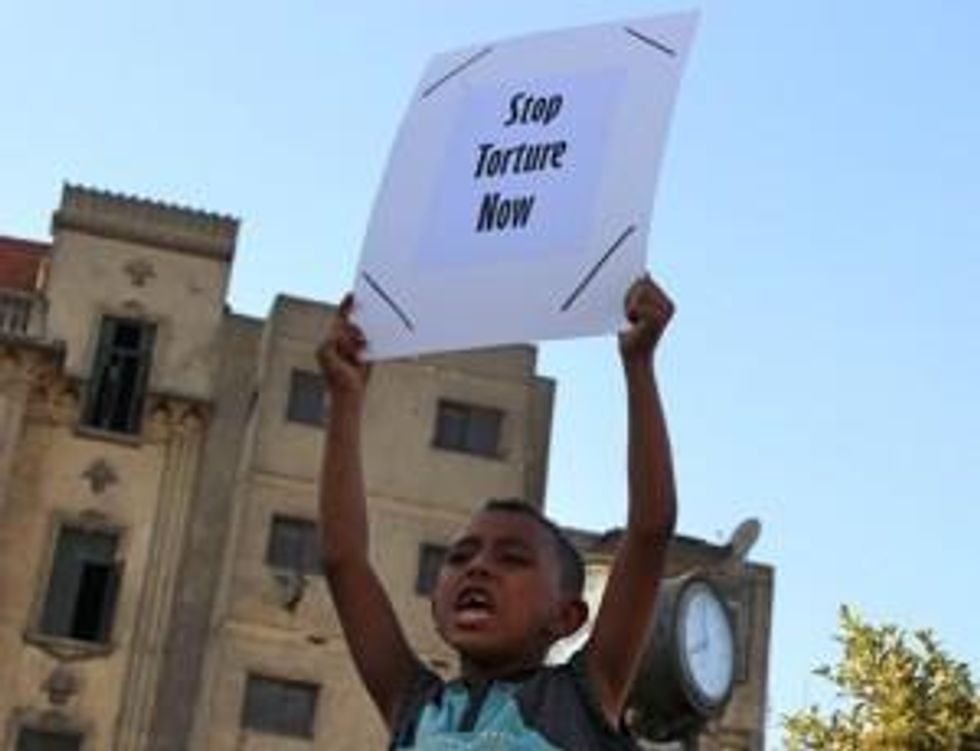Ahram Online reports: "[Egypt] is bracing for a wave of protests running up to and including 30 June -- the day that will mark a year since Morsi was sworn into office following a narrow victory over Ahmed Shafiq in the runoff round of the presidential elections. The rallying call for the demonstrations is the demand for early presidential elections to end economic, security and other failures that came with Morsi's rule, according to leading opposition figures who have been drumming up support for the demonstrations."
Dr. AIDA SEIF AL-DAWLA, aidaseif at yahoo.com, https://www.alnadeem.org/en
Al-Dawla is with Nadeem Center for Victims of Torture. She was profiled by Time magazine as a global hero in 2004. The Nadeem Center is among a group of non-profits, bloggers and activists highlighting the continuation of torture in post-Mubarak Egypt on the website https://against-torture.net.
She said: "Systematic torture is continuing and Morsi's regime governs with the same policies as SCAF [Supreme Council of the Armed Forces] and as Mubarak's regime before him. Torture is always a tool of governing where the ruler has nothing to offer the people, when basic rights in freedom, work, decent wages, health care and education are violated; when the interests of the few are protected at the expense of those of poor, marginalized majority of the country and when the ruling regime needs a cover-up for its failures and when sectarian strife spreads nationwide. Under those conditions the regime resorts to random detentions, torture, maltreatment, killing, assaults and harassment on the streets in the hope of spreading fear and terror and ensuring a silent street, empty of protests, opposition and revolution.
"Torture is protected by laws which are not drafted by a few individuals but by a legislative authority, to be implemented by an executive authority and monitored by a judicial authority. The legislative authority in Egypt reduced the definition of torture to torture of defendants. Anybody who is subjected to torture without accusations is not considered a victim of torture irrespective of the brutality and the outcome of the crime whether it took place in the home, on the street, in the police station, or in prison. The legislature also decided that torture is not defined as such if it does not target confessions. So torture aiming to terrorize, to break a person's dignity, to teach a lesson, to humiliate, is not considered torture in Egyptian law. Furthermore the law also provides protection to torturers, since they cannot be brought to justice except after the approval of the public prosecutor who is authorized to close any file and ignore any complaint of torture under the pretext of lack of evidence -- a decision that cannot be appealed or contested except after presenting new evidence, which again can be discarded, the file closed again."
SHARIF ABDEL KOUDDOUS, sharif at democracynow.org, @sharifkouddous
Kouddous is a correspondent for "Democracy Now!" and a fellow at the Nation Institute. He recently wrote a piece for the Nation titled, "Egyptians to Morsi: 'We Don't Want You.'" Said Kouddous: "One year ago, many Egyptians had hoped the inauguration of the country's first-ever democratically elected president would mark a turning point following decades of autocratic rule and a turbulent transition. Yet since Morsi took office, the political quagmire has only deepened, the economy has been in decline and daily life has become harder for most Egyptians.
"The country is plagued by frequent fuel and diesel shortages that create long lines outside gas stations and cause incapacitating traffic jams. Electricity blackouts have become a daily routine during the hot summer months. Prices for food, medicine and other staple goods have sharply risen as the Egyptian pound has lost 10 percent of its value leaving already impoverished families less to live on. Unemployment is growing, tourism and investment are down sharply, the stock market hit an eleven-month low last week, while insecurity, crime and vigilante violence are on the rise."
GHADA TALHAMI, talhami at mx.lakeforest.edu
Talhami is emeritus professor in the department of politics at Lake Forest College. Her books include The Mobilization of Muslim Women in Egypt and Palestine in the Egyptian Press.
She said: "Those who expected Egypt's revolution to turn into a Western-style 'Arab Spring' should now revise their calculations. To assume that Egypt's anger at the blatant abuse of power, the corrupt practices, and the colossal foreign policy failures (especially on the Palestinian front) of Mubarak's authoritarian regime would be content with the substitution of another authoritarian government for the previous one no matter their ideological differences flies in the face of Egypt's rich political history.
"The most naive interpreter of Egypt's anti-Mubarak rage was the Muslim Brotherhood itself. Encouraged by his populist base, Morsi proceeded to ignore all constitutional norms and cobble together a ramshackle alliance of pro-Qatari Salafists, bureaucrats and army officers. As in all revolutions, the extent of the neglect and abuse by Egypt's first ideological/social class to rise to the top in the post-Mubarak months will inevitably drive the masses away from the ballot box and into the revolutionary arena. This is because, as Morsi seems not to want to learn, Egypt is undergoing a revolution of great expectations.
"The best that one can hope for at this moment is to allow Egypt's secular masses of workers, women, Christians, liberals and students to take charge themselves. The greatest lesson to the West should be that the Arab masses will not tolerate the subversion of their 'Arab Springs' by the pouring of more Salafis and ill-begotten weapons into the country as had happened in Syria. And perhaps the retirement or forced removal of Sheikh Hamad al-Thani from Qatar's leadership helm will be a lesson to all those who established themselves at the heads of 'revolutionary' governments in Libya and Tunisia by seizing power with the help of outside forces, ignoring their own native people."





